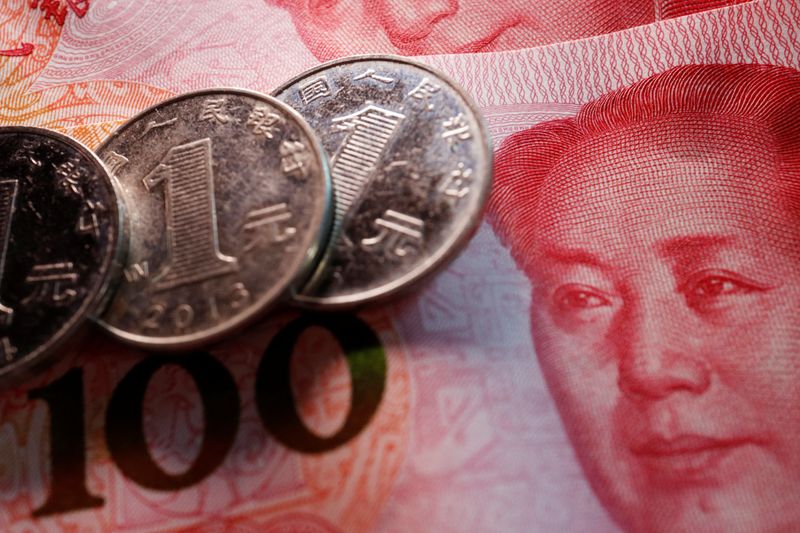 © Reuters. Coins and banknotes of China's yuan are seen in this illustration picture taken February 24, 2022. REUTERS/Florence Lo/Illustration/Files
© Reuters. Coins and banknotes of China's yuan are seen in this illustration picture taken February 24, 2022. REUTERS/Florence Lo/Illustration/Files
SHANGHAI (Reuters) - The yuan's slump has triggered a scramble by Chinese companies to hedge against the risk of further depreciation, which analysts say could add downward pressure on the currency.
The yuan's 4% tumble in April, its steepest monthly drop since foreign exchange reforms of 1994, is being driven by portfolio outflows, a rising U.S. dollar and a gloomy economic outlook at home.
Lopsided corporate hedging presents yet another risk to the currency as it touched a fresh 18-month low on Friday and jitters swept global markets.
"The expectation of further renminbi depreciation has pushed more companies to hedge against the risk," said Wang Dan, chief economist of Hang Seng Bank (China), calling the yuan by its official name.
"By locking into a forward contract, demand for dollars rises immediately in the market, imposing more downward pressure on the renminbi," she said.
Meanwhile, exporters' views on what to do with their proceeds are diverging, Wang added, with some converting more dollar revenue to yuan in recent weeks, while others are holding out and betting they can get a better price if the yuan keeps falling.
Yuan/dollar forward transactions nearly doubled from a year earlier to 100 billion yuan ($15 billion) in April, official data showed, the heaviest month of trading since late 2017.
The data does not show the direction of the bets, but non-deliverable forwards are priced for a steady decline in the yuan over the next year and sentiment suggests businesses are concerned about the global backdrop and are buying dollars.
Han Changming, managing director of a car importer in southern Fujian province, said he uses forward contracts to hedge the risk the yuan will depreciate further.
The United States has been raising interest rates, while China has been easing monetary policies, so "the trend of yuan depreciation in quite clear," he said.
Other hedging tools also witnessed a spike in activity, with yuan futures turnover in Hong Kong hitting a record on April 25 as the yuan slumped in spot trade.
DIRECTIONAL BETS
China's forex regulator has been stepping up efforts to persuade companies to hedge currency risks using a "market neutral" mentality, and domestic financial institutions have for months avoided making clear forecasts on the yuan's outlook.
But in reality, positions are hardly neutral and client memos seen by Reuters show banks have continued to advise customers on the currency's likely decline or warn it will at least remain volatile.
Bank of Communications said it's stepping up efforts to help companies manage currency risks.
The lender recently advised Chinese miner Chongyi Zhangyuan Tungsten Co lock in forward contracts for a $7.5 million cross-border loan, buying dollars to guard against a potential fall in the yuan.
To be sure, there are exporters selling dollars at spot prices to convert profits to yuan at favourable levels, and some bankers also reported increased dollar selling in the forward market.
But in the absence of official pushback - and authorities have been allowing the yuan's trading band to move lower - analysts think corporate behaviour may exacerbate the downward momentum.
"Hedging positions were light until about two weeks ago, and many exporters may have also been caught off guard by the latest move," UBS chief China economist Wang Tao wrote.
"As more market participants hedge the risk of further CNY depreciation, this could add to the momentum of the CNY depreciation."

